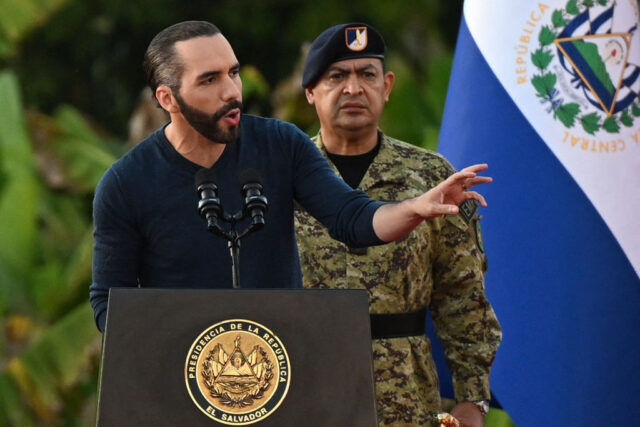
What is the point of a national government?
Can a government serve its people if it is not democratically elected?
The answer to the second depends on the answer to the first.
Consider El Salvador. The president, Nayib Bukele, was democratically elected in 2019 and proceeded with wide-ranging arrests of criminals and gang members with nary a thought to their “rights.” His nationwide dragnet caught up tens of thousands and some indiscriminately so — but freed the law-abiding citizenry from a reign of terror with some of the highest murder rates in the Western world and an economy based on payoffs to drug lords.
The people of El Salvador give very, very high marks to their less-than-human-rights-or-prisoner-rights-oriented president. Now others in the region want to emulate him.
The U.S. is considering sanctioning El Salvador over its democratic deficits.
Questions: Will economic sanctions help the people, or will it make them hungrier? Will it provide a wider opening for China? Will it help the government become more democratic? How?
Move now to Africa. While El Salvador has received little press attention, the recent coup in Niger has received a bit more – mostly having to do with some presumed backsliding on democratic norms in Niger.
But look more closely.
In June, Omar Touray, president of the 15-nations known as Economic Community of West African States (ECOWAS), reported to the U.N. Security Council that there were more than 1,800 terrorist attacks in West Africa in the first six months of 2023, resulting in nearly 4,600 deaths. Touray told the UN that half a million people in ECOWAS countries are refugees and nearly 6.2 million are internally displaced. If there isn’t an adequate international response to the 30 million people ECOWAS assesses need food right now, he said, another 12 million will be added to the rolls next month.
U.S. deputy ambassador Robert Wood told the U.N., “The United States remains gravely concerned by democratic backsliding across the region” and is “deeply concerned by the spread of instability in coastal West Africa.”
Mr. Ambassador, coastal West Africa is not “backsliding,” it never was a secure, democratic region. In the last ten years, there have been 15 coups and 33 attempted coups – some countries had multiples, including the present object of concern, Niger, which had three coups and an attempt. Mr. Touray said “terrorism, armed rebellion, organized crime, unconstitutional changes of government, illegal maritime activities, environmental crises and fake news” were responsible for the region’s problems.
But Mr. Touray is discussing symptoms without mentioning the disease – ISIS.
ISIS, uncontrolled and well-armed, is wreaking havoc across the region. And the junta in Niger and the ones that took over in Mali, Burkina Faso, and Gambia make a further point – that civilian governments have proven incapable of controlling the security issues created by ISIS.
According to the U.S. National Counterterrorism Center, the military juntas are correct.
One of ISIS’s largest and most powerful regional branches, ISIS–West Africa controls broad swaths of territory… (It) rejects national borders and seeks to discredit regional governments and eventually replace them with an ISIS-style state… (promoting) sectarian violence and (exploiting) poor economic conditions and social divisions to attract members. It receives funding from ISIS core and local revenue sources, including kidnappings-for-ransom, taxation, and extortion.
ISIS has declared war – military war – on the region and all the other issues are weapons in its arsenal. Just as MS-13 and other gangs and cartels have done in El Salvador.
It is not an “American problem” to solve, but the West has not proven to be tremendously effective in counterinsurgency warfare. New strategy and tactics must be devised and executed. The war against ISIS and MS-13 must be won first because the other issues – civilian issues – require physical security and stability.
France couldn’t be rebuilt in 1942.
Speaking of France, there is clearly a strong element of anti-colonial sentiment among the people and the military juntas. West Africa was under French colonial control and the people have no confidence in it as a political or security partner. The U.S. is not former colonial power in Africa and the U.S. military was working with the military of Niger on stopping ISIS, which might account for the fact that the U.S. government is still in contact with the junta.
The U.S. has leverage and some political capital to spend – along with the money we have been spending. This leaves an enormous question for Washington to answer: What is the point of government? If the point is to defend the concept of “democracy,” there is one set of obligations. But if the point of government is to protect the people, there is another.
Form over function will not work.
That’s what we see playing out in both El Salvador and Niger.





